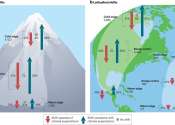Researchers reveal growth characteristics of duckweed in photoautotrophic, heterotrophic and mixotrophic conditions
Duckweeds (Lemnoideae) are a group of higher aquatic plants belonging to the Araceae and commonly found in freshwater habitats. They have been extensively studied as model plants in both theoretical research (photosynthesis, ...









